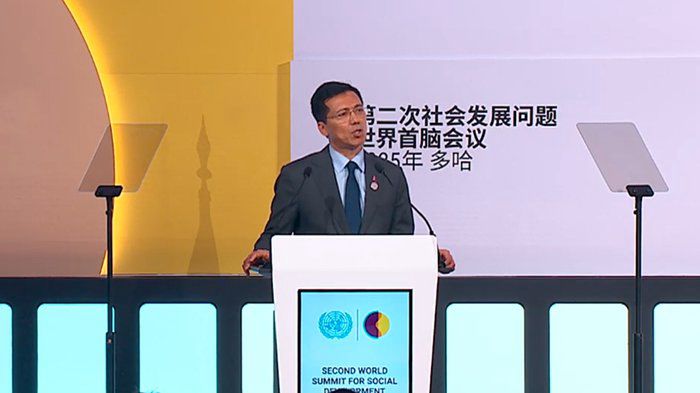
Kathmandu: The President of the United Nations Economic and Social Council (ECOSOC), H.E. Lok Bahadur Thapa, delivered a compelling opening statement at the Second World Summit for Social Development in Doha, urging world leaders to intensify collective action to address persistent global inequalities and strengthen the social foundations of sustainable development on November 4.
Addressing heads of state, ministers, UN leaders, and international delegates, Thapa thanked the State of Qatar for hosting the summit and acknowledged the leadership of His Excellency Omar Hilale of Morocco and Her Excellency Sophie De Smedt of Belgium in negotiating the Doha Political Declaration, which he described as “a balanced and forward-looking roadmap for advancing global social development.”
Thapa noted that while the world has witnessed significant progress in health, education, and connectivity since the first World Summit for Social Development in Copenhagen 30 years ago, only 35 percent of the Sustainable Development Goals (SDGs) are currently on track.
“Governments today face widening inequalities, declining opportunities for productive employment, and rising insecurity,” he said. The Doha Declaration, he emphasized, responds to these challenges by calling for urgent action on three interlinked priorities: ending poverty, ensuring full and productive employment and decent work for all, and promoting social inclusion.
Highlighting pressing global disparities, Thapa pointed out that more than 800 million people still live in extreme poverty, while billions more remain vulnerable to economic shocks. Informal employment affects over 80 percent of workers in Africa and nearly 70 percent in Asia, and wealth concentration continues to deepen. “Today, the richest one percent of the world’s population own more wealth than 95 percent of humanity,” he stated.
He also expressed concern over the erosion of trust in public institutions and growing polarization fueled by misinformation. “Distrust fractures social cohesion and undermines our ability to achieve the Sustainable Development Goals,” he warned.
Marking the 80th anniversary of ECOSOC, Thapa called the milestone an opportunity to reaffirm global commitment to cooperation, human dignity, and inclusive development. He highlighted that the five-year review process established under the Doha Declaration will be guided by the UN General Assembly, with ECOSOC playing a key role in coordinating implementation and translating commitments into action.
Under Nepal’s presidency, he noted, ECOSOC is prioritizing global cooperation on food security, climate resilience, financing for development, digital inclusion, and youth entrepreneurship—areas critical to social development and inequality reduction. Thapa also underscored the importance of ensuring meaningful participation of women, youth, and persons with disabilities in global decision-making processes.
“ECOSOC will continue to work with Member States, the UN system, and partners to ensure that the Doha Political Declaration translates into tangible improvements in people’s lives,” he said.
Concluding his remarks, Thapa called for unity and shared purpose: “Let us carry forward the spirit of Doha — with determination to build societies rooted in dignity, opportunity, and inclusion for all.”
The Second World Summit for Social Development continues in Doha with high-level discussions on global inequality, employment, and social protection.